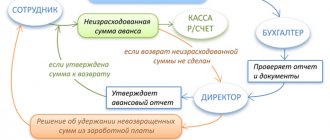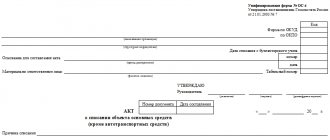How not to lose on taxes when using borrowed funds
Situations where inspectors make tax claims against a company in connection with the use of borrowed funds often arise in practice*. But mostly it is customary to talk about borrowed funds in connection with refusals to deduct VAT. In particular, in the “DSP” documents of tax authorities dedicated to tax evasion schemes, those cases are described when, when paying with borrowed funds, VAT deductions were denied *.
Meanwhile, the tactics of dealing with claims regarding the refusal of VAT deductions are already known. Now payment does not matter for tax refund. All that is required is an invoice and that the goods (work, service) be accepted for registration (clause 1 of Article 171 of the Tax Code of the Russian Federation). Therefore, the company does not have any special problems if the inspector suddenly decides to refuse to deduct VAT when using a loan.
But there is another position of the tax authorities, which is not so widely known, since it is not clearly stated in their documents. But it clearly follows from arbitration practice: when calculating with borrowed funds, there is a reason to refuse to take into account expenses for income tax. This is exactly the tactic that local inspectors choose. How can a company protect itself in advance?
LOANS DO NOT AFFECT TAXES
Let's start with the arguments that companies can make in their defense in any case of denial of accounting for expenses paid with borrowed funds, regardless of the specific situation.
The Tax Code does not indicate any restrictions on expenses made using borrowed funds. Consequently, the calculation of tax cannot depend on whether the company used borrowed or own funds. And the Plenum of the Supreme Arbitration Court of the Russian Federation, in resolution No. 53 dated October 12, 2006, indicated that the validity of tax benefits cannot be made dependent on the methods of raising capital: the use of own, borrowed funds or the issue of securities. In addition, from the moment the money is received in the current account, it becomes the property of the company (Article 807 of the Civil Code of the Russian Federation). That is, it is impossible to separate borrowed funds from your own.
The courts take into account both the first and second arguments (for example, decisions of the federal arbitration courts of the Volga region dated September 27, 2007 No. A12-1208 / 07-C60, North-West from September 10, 2007 No. A05-12441/2006-31, Volgo-Vyatsky dated 11.10 .06 No. A29-8385/2005a districts).
OPINION OF A PRACTITIONER
Maxim DOMUKHOVSKY
, chief accountant of several companies:
— Indeed, there is a problem with claims for expenses made using borrowed funds. I’ll tell you how one company solves it in practice. She pays an advance to the real seller of the goods, but after a few days this advance is returned (for justified reasons - for example, the goods are out of stock). As a result, the returned money has already mixed with the general mass; it is no longer borrowed.
OUTSTANDING LOAN
If the company has not repaid the loan, tax authorities, refusing to take into account expenses incurred through borrowed funds, may refer to the fact that the company did not have real expenses. In particular, this argument was presented, among others, in a case considered by the Federal Arbitration Court of the East Siberian District (resolution dated 04/06/06 No. A33-9867/05-Ф02-1356/06-С1). Let's say right away that the court supported the inspectors.
The situation was as follows. The company ordered marketing services and paid for them using borrowed funds. Tax officials refused to include expenses for income tax purposes, citing the lack of connection between the expenses and the company's production activities and the fact that the reports contained general information not directly related to the company's core activities. Also, tax authorities have repeatedly emphasized (and the court supported them in this) that since the services were paid for with borrowed (and partially outstanding) funds, the company did not incur real costs. Therefore, service expenses cannot be accepted for income tax purposes.
EXPERT COMMENT
Alexander BELICHKO
, Deputy Head of the Audit and Tax Consulting Department at MCFR-Consulting: - In my opinion, the tax authorities’ claims that the company did not incur expenses when purchasing property if it did not repay the loan are unfounded. Costs can be expensed for the purposes of calculating income tax without paying them; this is not required by law.
Note that if the company does not repay the loan on time, it runs the risk that tax authorities will classify these funds as gratuitously received income. Of course, inspectors will not evaluate any loan that is not repaid on time in this way. After all, the legislation allows for a situation where a company has an unrepaid loan (Clause 2 of Article 266 of the Tax Code of the Russian Federation). In this case, the Tax Code requires that after a certain period (three years from the date of the event, Article 196 of the Civil Code of the Russian Federation) it be taken into account in non-operating income.
But if the outstanding debt has signs of a sham transaction from the point of view of the tax authorities (for example, the lender did not take action to repay, and the borrower did not show any intention to repay the debt, or the terms of repayment of the interest-free loan are repeatedly postponed), the tax authorities may attempt to reclassify it as a gratuitous transfer. In particular, such a case was considered by the Moscow Arbitration Court (decision dated December 12, 2006 No. A40-58426/06-33-366). This is a decision of the court of first instance, but it entered into legal force and the parties did not appeal it.
The company received a loan from a bank for a period of two weeks and used it to purchase 90 railway tanks for its own use. After that, I repaid the loan using interest-free loans issued by third companies. The organization received loans secured by its own bills. The term of the loan agreements was repeatedly extended and expired in 2006.
In 2006, tax officials conducted an audit and found that the tax base for income tax was underestimated. The following circumstances served as the basis for this conclusion. Loans are provided on repayment terms. In this case, they were not repaid because the lenders did not apply for their return. Consequently, the company has created a formal situation in which funds are transferred to the current account under the guise of being borrowed. At the same time, the purpose of creating this situation is to understate the income tax base and, as a result, non-payment of tax. Since income in the form of funds received under credit or loan agreements is not taken into account when determining the tax base (subclause 10, clause 1, article 251 of the Tax Code of the Russian Federation). The court agreed with the arguments of the tax authorities and indicated that, based on paragraph 8 of Article 250 of the Tax Code of the Russian Federation, property received free of charge is non-operating income.
Note that the judges did not consider (and the taxpayer did not raise) the argument about the statute of limitations. Otherwise, the court’s conclusion regarding the qualification of debt, the statute of limitations for which has not yet expired, could possibly change.
NO SENSE IN ATTRACTING A LOAN
Tax authorities are also confused by cases where a company can make expenses without borrowing, but still attracts them. According to inspectors, such transactions are initially aimed solely at minimizing taxation. The company can refute this argument by referring to the ruling of the Constitutional Court of the Russian Federation dated 04.06.07 No. 320-O-P. According to the Constitutional Court, tax authorities do not have the right to assess the feasibility, rationality, efficiency or resulting results of transactions. Their task is to assess the focus of activities on making a profit.
Arbitration practice is developing in favor of taxpayers. For example, the Federal Arbitration Court of the Northwestern District considered such a case (resolution dated 08.11.07 No. A05-3785/2007). Company A issued an interest-free loan to associate company B in the amount of RUB 23.4 million. for a long period, and then took money from the latter at interest (at a rate of 14%) in the amount of 26 million rubles. The tax authorities indicated that Company A cannot take interest into account as an expense. After all, company A received money at interest from company B, which is a borrower of company A. Moreover, this loan agreement is interest-free. Taken together, these circumstances indicate that there is no business purpose for the transaction.
But the court noted that the debt under the interest-free agreement was not overdue, the loan was used in business activities, and the interdependence does not affect the terms of the transaction. As a result, the company won the case.
A similar conclusion that the company independently makes decisions and evaluates the results of transactions when receiving and issuing loans, as well as on interest rates on them, was made by judges in other cases (resolutions of the Federal Arbitration Courts of the North Caucasus dated October 8, 2007 No. F08-6610 /2007-2452A, Moscow district dated September 25, 2007 No. KA-A40/9510-07).
Tax authorities also make claims against leasing carried out using loans**. For example, when a company raises borrowed funds in order to be able to pay under a leasing agreement. And, moreover, the lessor acts as her guarantor when receiving a loan.
This situation was considered by the Federal Arbitration Court of the Northwestern District (resolution dated October 11, 2007 No. A56-48231/2006). The company needed to purchase rolling stock. To do this, she used the services of a leasing company. Moreover, in order to be able to pay under the leasing agreement, she attracted credit funds with the participation of the lessor as a guarantor. The tax authorities decided that the transaction was feigned and was covering up a purchase and sale transaction.
Firstly, the inspectors argued, on the date of concluding the leasing agreements the company had sufficient funds (including credit) to independently acquire ownership of the equipment. Therefore, obtaining the same property on lease only leads to an overestimation of tax expenses. Secondly, the addresses of the permanent executive bodies of the lessor and the lessee are the same, and the current accounts are located in the same bank. Thirdly, the lessee was the only buyer of services from the lessor. However, the court, supporting the company, noted the following. The tax authorities did not prove that the company had the opportunity to receive funds under loan agreements without participating as a guarantor of the lessor. That is, in fact, the company did not have the opportunity to purchase the train at its own expense. Also, the tax authorities did not prove that if the company had bought the property rather than leased it, its expenses would have been lower.
EXPERT COMMENT
Ilya MOKRYSHEV
, partner of Morgan Finance LLC: - Tax authorities even do an economic analysis of the activities of leasing companies. As a rule, for these purposes, a methodology developed by the FSFO is used (order of the FSFO of Russia dated January 23, 2001 No. 16, order of the Federal Department of Insolvency (Bankruptcy) dated August 12, 1994 No. 31-r), based on the results of which it is concluded that there is no economic goal - making a profit. In our experience, when protecting leasing companies, it is advisable to place the main emphasis on justifying the economic goal of the company’s activities, including an increase in the company’s assets as a result of its activities, an increase in the volume of leasing payments, etc.
As indirect evidence confirming that borrowed funds will be repaid in the future, you can use a positive credit history, letters from banks about the conscientious fulfillment of loan obligations.
* For more information about claims regarding accounting for interest on borrowed funds and how you can save in these cases, read the article “How not to lose on taxes when using borrowed funds” in PNP No. 12, 2007
** Read more about these situations in the articles “How to protect methods of reduction that tax authorities consider to be schemes” in “PNP” No. 11, 2007, p. 58, “Five new “evasion schemes”: a view from the tax authorities” on page 60 this number is "PNP".
Borrow it and sleep well
In total, the Supreme Court selected 19 questions that, in its opinion, required an answer.
One of the first such questions is about money lent.
Should a citizen pay tax on the amount borrowed? The question is not at all idle; the fact is that in some regions the tax authorities decided that it should. After all, the citizen took it and enriched himself.
But the Supreme Court did not agree with such requirements and confirmed the fair decisions of lower courts that money borrowed by a citizen is not subject to personal income tax, since it does not create an economic benefit for the person.
Well, what if an employee in his service receives a ticket for public transport or is paid for a gym? Is this a taxable benefit or not?
There are many similar claims in our courts. The analysis provides a condition under which benefits received by a citizen in the form of paid goods, works, and services are not subject to such a tax. And this is very interesting.
Thus, there is no need to pay tax on the income of an individual if the provision of such a benefit is primarily caused by the interest of the employer. That is, if a travel person received it not as a gift from the generosity of a boss, but simply because a subordinate has a traveling nature of work and he travels to different addresses all day, then no tax needs to be paid.
The Supreme Court emphasized that compensation payments that are provided for in an employment contract for the expected or actually incurred expenses of an employee related to the performance of his work duties are not subject to personal income tax.
As an example, the Supreme Court examined one arbitration dispute. A certain company challenged the tax authority’s decision to hold it liable in arbitration court. The businessmen did not pay tax on the rental of apartments that the company allocated for its employees.
Tax officials argued their claims this way: the company entered into employment contracts with nonresident employees. One of the terms of the contract was that the employer agreed to pay for the accommodation of citizens recruited to work in apartments specially rented for them. Since the apartments were used by employees, then, according to the tax authority, the employees had taxable income.
All courts: first instance, appeal and cassation with the requirement to pay the tax in such a situation did not agree. The Supreme Court said it was the right decision and explained why.
According to the Supreme Court, a mandatory sign of a citizen receiving income on which to pay personal income tax is the satisfaction of the interests of the citizen himself.
Therefore, when resolving such disputes, the court must answer the question: for what purposes did the employer rent the apartments? If in order to provide subordinates with the necessary working conditions, there is no need to pay.
The court said: the mere fact that as a result of providing a citizen with the benefits paid for him, the employee’s personal needs are to some extent satisfied, is not sufficient to conclude that taxable income has arisen.
The Supreme Court noted in this case that the apartments were rented on the initiative of the employer, who opened a branch in this city and visiting specialists worked there. These were people with special experience and qualifications who would not go to work in this branch without housing.
The court emphasized that these rented apartments are the most ordinary. They cannot be called luxury housing with elements of luxury.
Luxurious housing would indicate that. But you have to pay for it.
Thus, the Supreme Court emphasized, the costs of renting housing for employees were made by the organization primarily in its own interests. This means that there is no personal income subject to taxation.
If an employee is paid for a gym at work, is that a taxable benefit or not?
The court also answered another frequently asked question - what to do with the tax if one citizen simply gives real estate to another. According to the court, the tax base for donating real estate between individuals can be determined based on the cadastral (inventory) value of the property received by the citizen.
The Supreme Court also reminded that if citizens pay a penalty and a fine in connection with a violation of consumer rights, then tax must be paid on this amount. But monetary compensation for moral damage is not subject to personal income tax.
Some issues related to the application of standard and property tax deductions are considered.








